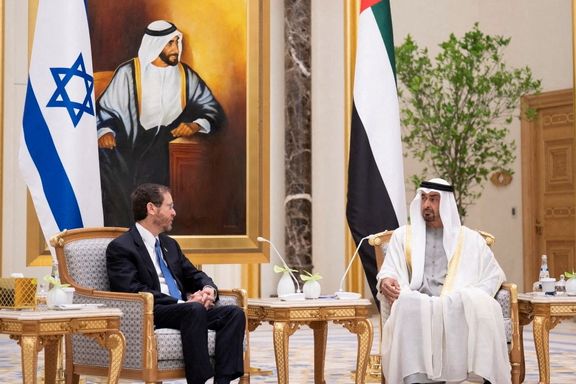Third Houthi Missile Attack On UAE Comes After Threat In Iran Media

Iran-backed Houthis fired a missile at the United Arab Emirates in the third such attack in January, while Israeli President Isaac Herzog was visiting the country.

Iran-backed Houthis fired a missile at the United Arab Emirates in the third such attack in January, while Israeli President Isaac Herzog was visiting the country.
UAE defense ministry said on Monday that the attack, 20 minutes past midnight was intercepted. There was no news of any missile hitting a target, but debris fell on an uninhabited area.
Yemen's Houthi group said on Monday it had fired a number of ballistic missiles at Abu Dhabi, capital of the United Arab Emirates, and had also fired several drones at Dubai, the regional business hub.
A senior official described the attacks as "useless" provocations that would be dealt with to safeguard national security and sovereignty. "Those who test the UAE are mistaken," the official, Anwar Gargash, said in a Twitter post.
The attack followed reports in Iranian media affiliated with the Revolutionary Guards (IRGC) on Sunday. Tasnim and Fars news agencies reported quoting Houthi officials that the Yemeni rebels were planning large attacks against the UAE and Saudi Arabia.
"Future strikes on the UAE will be more effective and more powerful than before and the UAE may lose its capability to run the country," Lieutenant-General Abed Al-Thour the Deputy Chief of the Ideological Department of the Houthi armed forces told Tasnim in an exclusive interview. He added that the Houthi military is determined to "go deep inside the UAE to achieve its military goals".
The spokesman of the State Department reacted to the attack in a tweet, saying, “We condemn the latest Houthi missile attack on Abu Dhabi. While Israel’s president is visiting the UAE to build bridges and promote stability across the region, the Houthis continue to launch attacks that threaten civilians.”
The Biden Administration lifted the terrorist designation for Houthis as soon as it assumed office last year, a move questioned by critics as an attempt to encourage the group to accept peace proposals. Houthis have refused to take any conciliatory step, such as agreeing to ceasefire.
Herzog, who was on a historic trip to UAE less than two years after establishing full relations, spent the night in Abu Dhabi. He discussed security and bilateral relations with the UAE’s de facto ruler Abu Dhabi Crown Prince Sheikh Mohammed bin Zayed Al Nahyan.
The spokesman of Iran’s foreign ministry, Saeed Khatibzadeh, commenting on Herzog’s visit to the UAE said, “Those who normalize relations [with Israel] should know…that the first victims would be” themselves.
"We are determined in our strategic vision and goals to help build a stable and prosperous region for all and provoking us is useless," said Gargash, diplomatic adviser to the UAE president.
The UAE's defense ministry said coalition warplanes had destroyed missile launchers that were located in Yemen.
The UAE is part of the Saudi-led coalition that has been battling the Houthis for nearly seven years in a conflict largely seen as a proxy war between Saudi Arabia and Iran.
The Houthis, who have repeatedly launched missile and drone attacks on Saudi Arabia, have warned they would continue targeting the UAE unless it stopped "interfering" in Yemen.
The UAE largely ended its military presence on the ground in 2019 but holds sway through Yemeni forces it arms and trains and which recently joined battles against the Houthis in key energy-producing regions.
With reporting by Reuters